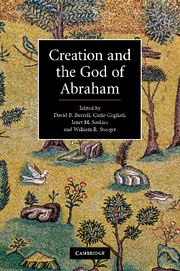Book contents
- Frontmatter
- Contents
- Contributors
- Preface
- Introduction
- 1 Creation ex nihilo: early history
- 2 Creatio ex nihilo: its Jewish and Christian foundations
- 3 The act of creation with its theological consequences
- 4 Scotistic metaphysics and creation ex nihilo
- 5 Creation and the context of theology and science in Maimonides and Crescas
- 6 Creation: Avicenna's metaphysical account
- 7 Four conceptions of creatio ex nihilo and the compatibility questions
- 8 Will, necessity and creation as monistic theophany in the Islamic philosophical tradition
- 9 Trinity, motion and creation ex nihilo
- 10 The Big Bang, quantum cosmology and creatio ex nihilo
- 11 What is written into creation?
- 12 Creatio ex nihilo and dual causality
- 13 God and creatures acting: the idea of double agency
- 14 Thomas Aquinas on knowing and coming to know: the beatific vision and learning from contingency
- Index
- References
Introduction
Published online by Cambridge University Press: 07 September 2010
- Frontmatter
- Contents
- Contributors
- Preface
- Introduction
- 1 Creation ex nihilo: early history
- 2 Creatio ex nihilo: its Jewish and Christian foundations
- 3 The act of creation with its theological consequences
- 4 Scotistic metaphysics and creation ex nihilo
- 5 Creation and the context of theology and science in Maimonides and Crescas
- 6 Creation: Avicenna's metaphysical account
- 7 Four conceptions of creatio ex nihilo and the compatibility questions
- 8 Will, necessity and creation as monistic theophany in the Islamic philosophical tradition
- 9 Trinity, motion and creation ex nihilo
- 10 The Big Bang, quantum cosmology and creatio ex nihilo
- 11 What is written into creation?
- 12 Creatio ex nihilo and dual causality
- 13 God and creatures acting: the idea of double agency
- 14 Thomas Aquinas on knowing and coming to know: the beatific vision and learning from contingency
- Index
- References
Summary
BACKGROUND TO THE VOLUME
Creatio ex nihilo is a foundational teaching in Judaism, Christianity and Islam. It states that God created the world out of nothing – from no pre-existent matter, no space or time. This teaching is the linchpin for classical accounts of divine action, free will, grace, theodicy, religious language, intercessory prayer and questions of divine eternity – in short, the foundation for any account of a scriptural God who acts in history but yet remains the transcendent Creator of all that is.
This book is the planned outcome of a workshop on ‘Creatio ex Nihilo Today’ held at Castel Gandolfo, Italy, on 9–15 July 2006, and sponsored solely by the Vatican Observatory. That consultation brought together some fourteen leading scholars of all three Abrahamic faiths to reflect on the metaphysical and theological ideas of the doctrine of creatio ex nihilo in light of contemporary developments in modern sciences. Each speaker was directed to a particular topic by the organisers – Bill Stoeger, S. J. (Vatican Observatory), Professor Janet Soskice (Cambridge) and Professor David Burrell, C. S. C. (Notre Dame) – and all followed their brief in presenting more questions than answers. After the conference, all participants were asked to reflect and to elaborate on the discussions their topic had raised among the delegates, and to produce a scholarly article.
- Type
- Chapter
- Information
- Creation and the God of Abraham , pp. 1 - 10Publisher: Cambridge University PressPrint publication year: 2010
References
- 1
- Cited by



